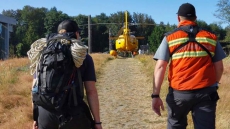VICTORIA — A researcher at the University of Victoria has received funding aimed at developing technology to help identify the Zika virus.
Grand Challenges Canada, a federally funded body that supports public health innovations, has awarded $50,000 for research on two applications spearheaded by chemist Alexandre Brolo.
His team is creating low-cost plastic strips that detect the presence of arboviruses, such as Zika and dengue, in saliva, which Brolo said would give health workers a speedy picture of who has the illness and where it might be spreading.
The strips are coated with nanoparticles that change colour when they come into contact with infected saliva.
Brolo and his fellow collaborators have also come up with a smartphone app that can spot mosquito larvae in stagnant water, while at the same time record and mark the location to assist those tracking Zika outbreaks.
The award will help fund a small-scale pilot project in Brazil, which has been badly hit by the virus, and serve as seed money for development of the larvae-finder app.
Brolo said the screening strips and the smartphone app will allow accurate and cheap collection of Zika data, giving health organizations the information needed to immediately treat infections and halt the spread of the virus.

"We need something that is simple, is low cost and requires very little training," Brolo said Thursday in an interview.
There are low cost tests for Zika, but they use blood, which Brolo said complicates sample collection and requires trained professionals.
Quick access to data is also a key to the innovations, something especially evident in the larva finder app, which takes a photo of infested water, identifies the species involved and uploads the details to a type of Google map, said Brolo, who is originally from Bazil.
"I think the combination of the two technologies would be perfect to contain outbreaks, because now you can get these guys going in and getting information really, really fast and then you can start attacking vectors in those particular areas and contain the outbreak as fast as possible," he explained.
Brolo said he's hopeful that as tests progress, more funding will be available to scale up both projects and implement them on a larger scale.
The Zika virus causes only a mild and brief illness in most people. But in the last year, infections in pregnant women have been strongly linked to fetal deaths and to potentially severe birth defects, mostly in Brazil.
The virus is spread mainly through the bite of a tropical mosquito called Aedes aegypti.


